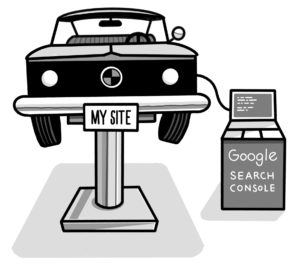 When you’re creating a digital marketing plan, you’ll have to make the decision whether to outsource the work or handle it within your own company. As a business owner, your time is more valuable than anyone else’s on your team. It doesn’t always make sense for you to spend your time building an SEO strategy yourself. Choosing the right team members to handle the job is an important factor in the success in maintaining SEO effectiveness long term.
When you’re creating a digital marketing plan, you’ll have to make the decision whether to outsource the work or handle it within your own company. As a business owner, your time is more valuable than anyone else’s on your team. It doesn’t always make sense for you to spend your time building an SEO strategy yourself. Choosing the right team members to handle the job is an important factor in the success in maintaining SEO effectiveness long term.
The first question you must consider is whether you should build an in-house agency to handle the job or outsource it to a digital marketing firm. There are advantages and disadvantages to each approach, so it’s about picking what’s best for your business. Then, whichever you choose, you’ll need to learn how to monitor them well to ensure you see a return on your investment with increased revenue.
Start by considering the size of your business. An in-house agency offers you a lot of benefits and control, but it may not be reasonable if you run a smaller company. I don’t recommend starting an in-house agency unless you can feasibly spend at least $25,000 a month on it. This is a fantastic option for some businesses, but it does require a great deal of resources. You can’t expect to just hire a single full-time SEO expert to run your entire digital marketing strategy. There are simply too many moving pieces involved for one person to do all of them effectively—SEO, link-building, website design, content strategy and creation, and many more things are involved. I like to say that hiring a single SEO expert to handle your digital marketing is like hiring a single contractor to build your house. You need a variety of experts to do the job well and get the results you want.
Your digital marketing team, whether you’re outsourcing or building it yourself, should include the following roles at least:
- Marketing director: Coordinates all marketing activities, digital and nondigital.
- Digital marketing manager: Manages the digital marketing team and communicates with the marketing director.
- Copywriter: Crafts engaging and informational content for your website with strong storytelling skills.
- Technical SEO lead: Specializes in technical SEO issues and has a proactive approach to marketing strategy.
- Web developer: Creates the website and implements technical recommendations, with a strong programming skillset.
- Public relations specialist: Interacts with the media and builds the brand reputation.
- Link-building and outreach specialist: Works to create new inbound links to the website to improve its authority and searchability.
- Social media manager: Manages the business’s social media to create organic traffic growth, and should be a member of your in-house team even if you hire an agency.
- Paid media strategist: Sets up and manages paid ad campaigns.
- Graphic designer: Creates graphics for the website as well as any other content you publish.
- Video editor: Edits videos to generate more leads on your website, social media, and YouTube channel.
- Data analyst: Tracks data so you understand where new leads are coming from to help you make better adjustments to your marketing strategy.
Considering the number of professionals needed, you can probably see why many business choose to hire a digital marketing firm. A good digital marketing firm will have all of these individuals and more to meet your specific needs, although there may be a few of these roles that would benefit you to hire separately so you have access to them whenever you need, such as a marketing director, graphic designer, and video editor.
A digital marketing agency that has all of the roles and resources listed above may cost a considerable amount of money, but it’s worth investing in. Hiring an inexpensive firm might seem like a good way to cut costs, but small companies don’t have as many resources and can’t provide you with a return on your investment. They may even result to SEO shortcuts that may show an initial boost in your traffic but will ultimately be penalized by Google, hurting your business in the long run.
Even though the cost of hiring a digital marketing firm may be high, it is often less expensive than building your own in-house team and requires less money and work upfront to launch your SEO strategy. The decision to hire an agency or build one is about what makes the most sense for your business. If you’re able to invest what’s needed into building your own team, it may make sense for you. Or if your budget is small enough that you can’t afford to hire a full-service marketing firm, it may be better for you to hire a few full-time individuals who are skilled in multiple areas. Consider if you hire an inexperienced digital marketing agency, will they be able to get the desired outcomes, or should you make the decision to hire differently for a strong return on investment?
Once you’ve hired your digital marketing team, whether they’re in-house or an agency, you and your team will need to monitor progress. Do they regularly publish high-quality new content? Is the content compelling enough that you would be interested if you were your own customer? It’s important to work closely with the digital marketing team to provide feedback and direct them. You don’t have to be the one to give the feedback—it could be your marketing director.
Whenever you evaluate your digital marketing efforts, take a step back and look at it from the customer’s perspective. Even if your team is doing everything correctly, focusing on the wrong topics can cause your strategy to fail. Your content should be written at about an eighth grade reading level so it’s very accessible to your audience, and it should express sympathy for your client and whatever their problem is that your business solves.
Remember, SEO takes constant maintenance and adjustments. When you make adjustments, it’s important to watch whether the adjustment improves the results or not. Otherwise, you’re just stabbing in the dark.
Whether you choose to build your own digital marketing team or hire an agency, make an effort to understand SEO strategy. If you don’t know what they’re doing or why they’re doing it, you’ll have no way to effectively monitor whether or not it’s working. You can be successful with either decision, but it takes some involvement from you to get the optimal results.




